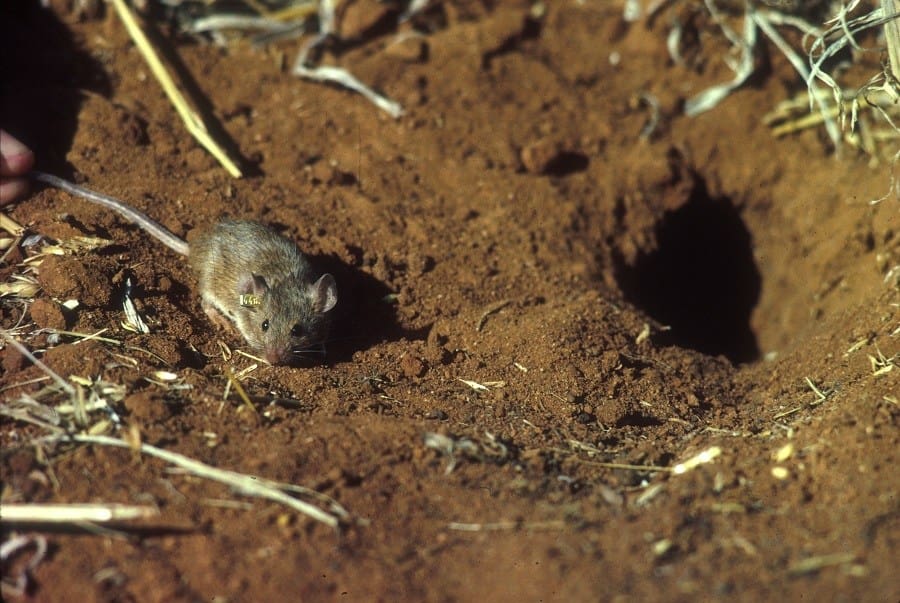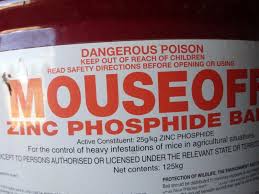
(Photo: CSIRO)
WITH producers across Australia’s eastern states facing extreme mouse numbers, questions are being asked about the most effective means of control.
Pest control expert and managing director of vertebrate pest control company Animal Control Technologies Australia (ACTA), Dr Linton Staples, says significant research and experience over decades has demonstrated baiting provides the only effective means of large-scale mouse control in crops.
Many crops have been saved and the benefit of using bait far exceeds its cost.
Zinc phosphide is the only approved chemical control measure for mice in large-scale agriculture in Australia. It is the active chemical used – at 25 grams/kilogram – in ACTA’s product Mouseoff.
Dr Staples said baits made with zinc phosphide were highly effective, quick acting, targeted and left no environmental residues or food chain accumulation. They have been the mainstay of mouse control for 24 years.
Emergency permit
Earlier this month, the Australian Pesticides and Veterinary Medicines Authority (APVMA) issued an emergency permit to allow double the concentration of zinc phosphide in mouse baits such as Mouseoff in response to an application by Grain Producers Australia.
 In response to the APVMA decision, ACTA is now working to develop a higher dose formulation of Mouseoff.
In response to the APVMA decision, ACTA is now working to develop a higher dose formulation of Mouseoff.
However, Dr Staples reassured producers that the current 25g/kg zinc phosphide products such as Mouseoff (sterilised seed quality grain based) and Mouseoff Econobait (unsterilised seed quality based) had proven high performance over 24 years.
“These and other APVMA registered products are consistent with international use of zinc phosphide for broadacre mouse control at 20-25g/kg,” Dr Staples said.
“With these Mouseoff products, more than 90 per cent of mice are killed within one or two days of application in most rural situations. While some farmers do require second or third applications, as provided on the APVMA approved label, the vast majority of users achieve excellent results after one application with no non-target impact.
“There are a variety of reasons why mouse numbers may not be reduced to target levels after an initial baiting. For example, in situations of extremely high local mouse numbers in crops (as distinct from around sheds and haystacks), we expect that additional baiting may be required due to the sheer number of mice, not the performance of the bait.”
Misleading statements
Dr Staples said statements by one researcher that all the established products only kill 50pc of mice were based on laboratory data and some extrapolation which had not been released or peer reviewed, and were very misleading.
He said if this was the case, there would have been many fewer grain harvests over the last 24 years.
“Properly conducted and controlled and peer reviewed field trials are needed to confirm that doubling the dose rate of poison actually solves the need for occasional reapplication and to inform users on when such bait is needed. Increasing poison application by such a large factor must be evaluated carefully,” he said.
Dr Staples said ACTA was committed to continue working with industry and research organisations to field test the higher dose bait.
“We expect small pilot quantities of the higher dose formulation, Mouseoff 50 Zinc Phosphide bait, to be available for delivery in mid-June,” he said.
Covid-19 supply impacts
Dr Staples also warned that Covid-19 impacts on air and sea transport of all goods had severely delayed the supply of active ingredients for mouse bait in Australia.
He said while zinc phosphide was in short supply there was a risk of less crop area being protected if only double-dosed product was used.
“Industry needs to act with caution to ensure producing a higher dose zinc phosphide bait does not interrupt the supply of the current proven technology and the crop protection it provides, or crops could be lost as a result,” Dr Staples said.
The difficulties and delays in securing sea freight resupply of raw materials have been largely overcome by ACTA funding 10 airfreight consignments of chemical costing over $0.5 million.
The company has not received any financial or logistics support from state or federal governments.
Caution on alternative bait
Regarding recent announcements in New South Wales about the supply of Bromadiolone-based bait to apply to farmers’ grain, Dr Staples said the use of this technology needed to be strictly controlled.
“I understand that alternative technologies are needed and we are assisting the NSW government in their program. However, there are reasons why the permit for Bromadiolone grain bait use was withdrawn almost 10 years ago.
“Bromadiolone takes up to eight days to kill a mouse, not the 24 hours claimed in various sources. During that time, the mice will continue to damage crops, but will also eat more doses of bait, even though the initial dose of bait will kill them.
“This extended feeding on bait can lead to accumulation of Bromadiolone in the mice. This means that if they are eaten by a domestic animal or native predator such as an owl or eagle, those animals may also accumulate a toxic dose in time. Fortunately, for domestic animals Vitamin K is an effective antidote,” Dr Staples said.
“The baiting protocols, such as spreading rate, days between repeat bait applications and areas treated, of Bromadiolone-based grain baits must be monitored by well-trained government experts, such as the NSW Local Land Services teams. We expect an APVMA permit, if issued, will address these controls to ensure correct use and also monitor any unwanted impacts.”
He also cautioned that doing nothing was not an option.
“Mice themselves are an environmental disaster. They not only destroy crops and ruin valuable fodder reserves and damage farm equipment, but also destroy seed banks for native plant species and compete with native wildlife species.”
Food chain accumulation does not occur with zinc phosphide baits which is why these baits are preferred for broadacre large-scale mouse management.
“Good stewardship is essential in the use of all chemicals,” Dr Staples said.
“A failure to achieve best practice, or the use of illegal chemicals or insecticides in an attempt to control mice, could tarnish registered products and lead to reduction of access to all rodenticides in time.”
Source: ACTA



HAVE YOUR SAY